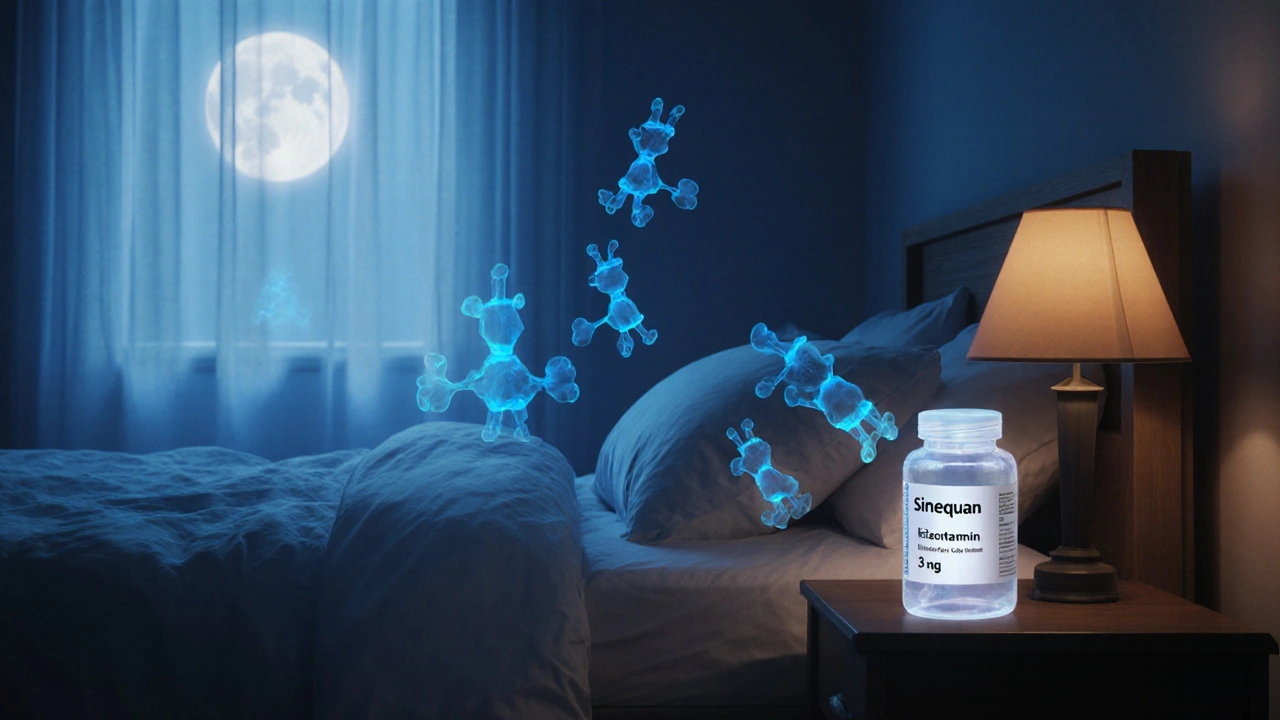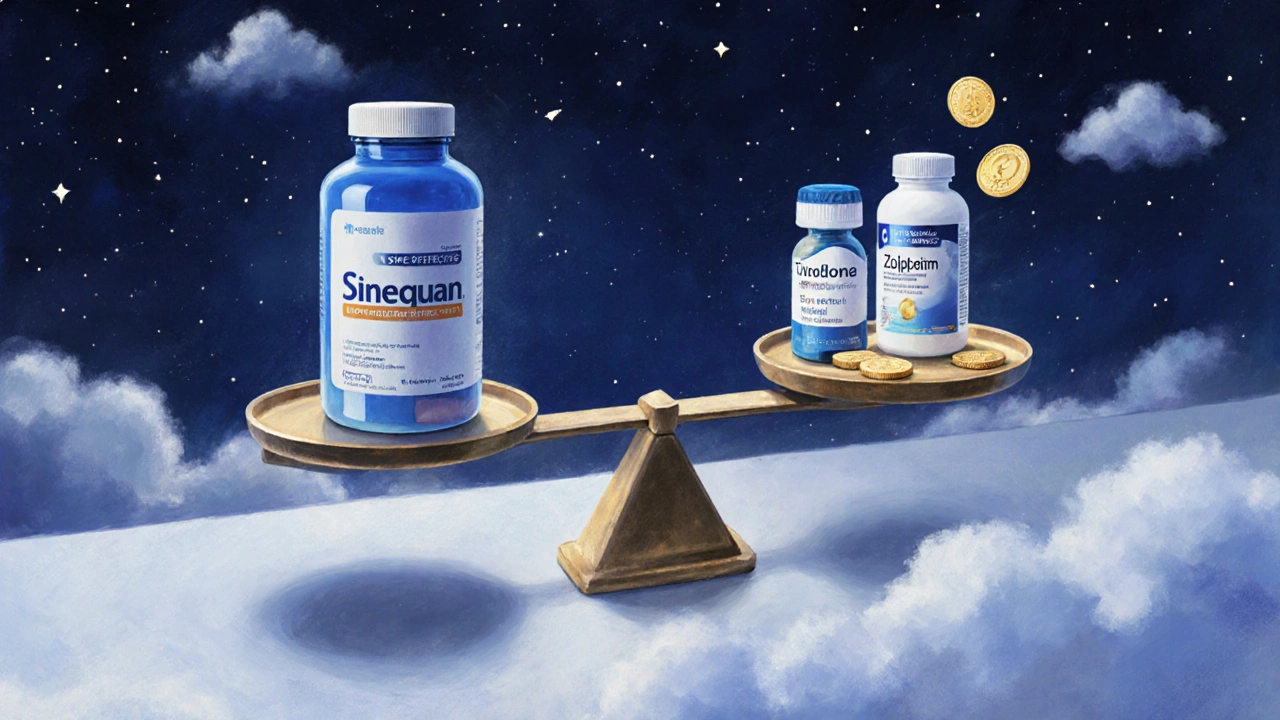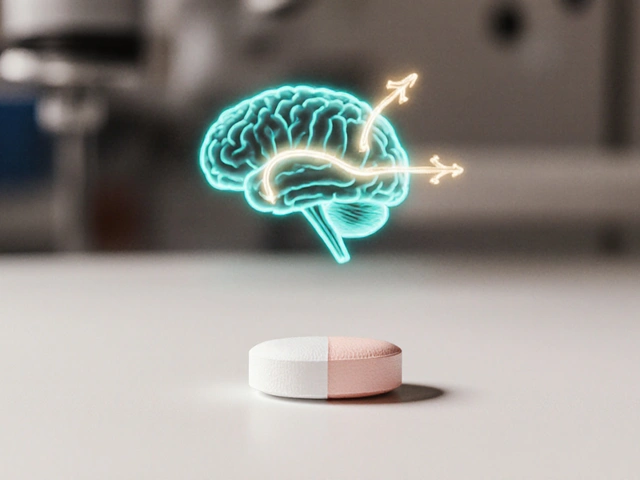
Insomnia Medication Selector
Your Sleep Profile
Personalized Recommendation
Enter your details to get a personalized recommendation
Recommended Option
Best MatchWhy this matches your needs:
Considerations
When it comes to treating insomnia, Sinequan is a brand name for doxepin, a low‑dose tricyclic antidepressant approved for sleep maintenance. It works by blocking histamine H1 receptors, helping you stay asleep without the “hangover” many other sedatives cause.
Quick Takeaways
- Sinequan uses a low dose of doxepin (3‑6mg) to promote sleep continuity.
- It’s non‑controlled, making it a safer option for long‑term use compared with many hypnotics.
- Common alternatives include Trazodone, Zolpidem, and Suvorexant.
- Side‑effect profiles differ: Sinequan is less likely to cause morning grogginess but may cause anticholinergic effects.
- Cost varies widely; generic doxepin is often cheaper than brand‑name hypnotics.
How Sinequan Works
Doxepin belongs to the tricyclic antidepressant family, but at the low doses used for insomnia (typically 3mg for adults, up to 6mg for older patients) it primarily acts as a potent histamine H1 antagonist. By dampening the wake‑promoting histamine pathway, it lengthens total sleep time without markedly reducing sleep latency. Because the dose is far below the antidepressant threshold, the drug’s impact on norepinephrine or serotonin reuptake is minimal, limiting classic tricyclic side effects.

Comparison Table
| Medication | Primary Indication | Typical Dose (Adult) | Onset of Action | Half‑life | Common Side Effects | Avg Monthly Cost (US$) |
|---|---|---|---|---|---|---|
| Sinequan | Insomnia (sleep maintenance) | 3-6mg nightly | 30-60min | 15-18h | Dry mouth, constipation, mild dizziness | 15-30 |
| Trazodone | Insomnia, depression | 50-100mg nightly | 30-45min | 6-12h | Morning grogginess, orthostatic hypotension | 10-25 |
| Zolpidem | Short‑term insomnia | 5-10mg nightly | 15-30min | 2-3h | Drowsiness, sleep‑walking, memory gaps | 20-40 |
| Suvorexant | Insomnia (sleep onset & maintenance) | 10-20mg nightly | 30-45min | 12h | Daytime sleepiness, abnormal dreams | 45-80 |
| Mirtazapine | Depression, insomnia | 7.5-15mg nightly | 1-2h | 20-40h | Weight gain, sedation, increased appetite | 12-25 |
| Amitriptyline | Depression, chronic pain, insomnia | 10-25mg nightly | 45-60min | 10-28h | Dry mouth, constipation, blurred vision | 8-20 |
| Doxylamine | Over‑the‑counter sleep aid | 25mg nightly | 30-60min | 10h | Next‑day drowsiness, anticholinergic effects | 5-12 |
Pros & Cons of Sinequan
Pros
- Low dose minimizes typical tricyclic side effects.
- Non‑controlled status avoids regulatory hurdles.
- Effective for sleep maintenance rather than sleep onset.
- Generic doxepin is inexpensive.
Cons
- Doesn’t help if falling asleep is the main problem.
- Possible anticholinergic effects (dry mouth, constipation) in sensitive individuals.
- May interact with other serotonergic or antihistamine meds.

Alternative Medications Overview
Trazodone
Originally an antidepressant, trazodone is often prescribed off‑label for insomnia because of its sedating properties. It’s cheap and widely available, but many users report waking up groggy. The drug also lowers blood pressure, so standing up quickly can cause dizziness.
Zolpidem
Zolpidem (Ambien) is a classic “Z‑drug” that induces rapid sleep. FDA limits use to 7‑10days due to dependence risk. Night‑time behaviors like sleep‑walking have been documented, making it a less attractive long‑term choice for many.
Suvorexant
Suvorexant is an orexin‑receptor antagonist that blocks the wake‑promoting orexin system. It works for both sleep onset and maintenance, but the price tag is high and some patients experience vivid dreams or next‑day sleepiness.
Mirtazapine
At low doses (7.5mg), mirtazapine’s antihistamine effect can be very sedating. It’s a good option when insomnia co‑exists with depression or anxiety, yet weight gain is a common complaint.
Amitriptyline
Amitriptyline is another tricyclic used off‑label for sleep. Its longer half‑life can cause morning drowsiness, and anticholinergic side effects are more pronounced than with low‑dose doxepin.
Doxylamine
Doxylamine succinate, the active ingredient in many OTC sleep aids, works via H1 blockade similar to doxepin but at higher doses, leading to more next‑day grogginess. It’s handy for occasional insomnia but not ideal for chronic use.
Choosing the Right Medication
Start by asking yourself three questions:
- Do I have trouble falling asleep, staying asleep, or both?
- Am I taking other meds that could interact with antihistamines or serotonergic agents?
- What is my budget and how long do I need the treatment?
If the main issue is staying asleep and you want a low‑risk, non‑controlled option, Sinequan alternatives like low‑dose doxepin (Sinequan) often win the vote. For bedtime anxiety or difficulty falling asleep, a short‑acting agent such as zolpidem or an orexin antagonist may be more effective. When depression or anxiety overlap, consider mirtazapine or trazodone, keeping an eye on weight or daytime sedation.
Always discuss with a healthcare provider before switching, especially if you have a history of heart disease, glaucoma, or are pregnant.
Frequently Asked Questions
Can I take Sinequan with other antihistamines?
Combining Sinequan with other H1 blockers (like diphenhydramine) can increase sedation and anticholinergic side effects. It’s best to avoid overlapping antihistamines unless a doctor advises otherwise.
How long does it take for Sinequan to work?
Most people notice improved sleep continuity within 30‑60 minutes after taking the nightly dose. Full benefit usually appears after a few nights of consistent use.
Is Sinequan safe for older adults?
Yes, the FDA recommends a lower maximum dose (6mg) for patients 65years and older to reduce the risk of anticholinergic effects. Monitoring for confusion or dizziness is advisable.
What should I do if I miss a dose?
Take the missed dose as soon as you remember, unless it’s already close to bedtime. In that case, skip it and resume your regular schedule the next night to avoid excessive sedation.
Can Sinequan cause weight gain?
At the low insomnia dose, weight change is uncommon. Significant appetite increase is more typical with higher antidepressant doses or with drugs like mirtazapine.





Neviah Abrahams
October 12, 2025 AT 12:39Look at this endless spreadsheet of sleep meds a circus of half‑baked promises the author thinks Sinequan is the holy grail yet forgets the cheap OTC champs that actually work for the masses
Uju Okonkwo
October 24, 2025 AT 02:26Hey everyone, just wanted to add a friendly note – if you’re struggling with staying asleep and budget is a concern, low‑dose doxepin can be a solid option. It’s generally well‑tolerated and the generic price is kind‑hearted on the wallet. Also, keep an eye on anticholinergic side effects if you’re sensitive. Remember, a good sleep hygiene routine pairs nicely with any medication choice.
Destiny Hixon
November 4, 2025 AT 15:13Honestly the US market loves to push brand names like Sinequan while cheap alternatives get written off as second‑class nonsense we should stop selling out to foreign pharma profiteers
mike brown
November 16, 2025 AT 04:59People act like Sinequan is the only answer but most of us just need something that puts us down for the night and doesn’t haunt us in the morning. The cheap OTC antihistamines work fine for occasional use, and the prescription route is just a cash grab. Plus, the whole ‘non‑controlled’ hype is a marketing trick to make you feel safe while they keep the profits flowing. If you’re not into big pharma’s drama, stick with the basics.
Brett Coombs
November 27, 2025 AT 18:46Look i hear the same old story – the government and big drug labs are hiding the real cheap sleep hacks from us. They want us to buy Sinequan because it lines their pockets while the real solution is a simple diphenhydramine tablet you can buy at any store. Trust no one that tells you you need a prescription for something that works just as well.
John Hoffmann
December 9, 2025 AT 08:33While the sentiment is clear, there are a few inaccuracies worth correcting. Low‑dose doxepin’s half‑life is roughly 15‑18 hours, not “short” as implied. Additionally, the term ‘anticholinergic’ should be used with caution because the dosage used for insomnia minimizes those effects. Precision matters when discussing pharmacology.
Shane matthews
December 20, 2025 AT 22:19I appreciate the discussion and just want to remind folks to keep personal health info private. Sharing dosage specifics publicly can lead to unintended advice loops. Stay safe and consult your prescriber for tailored guidance.
Rushikesh Mhetre
January 1, 2026 AT 12:06Great point! Remember, consistency is key – take the medication at the same time each night, avoid heavy meals before bed, and keep screens out of the bedroom. These simple habits amplify the drug’s effectiveness and improve overall sleep quality.
Sharath Babu Srinivas
January 13, 2026 AT 01:53Correction: the half‑life of doxepin is about 15‑18 hours, not 2‑3 hours. 👍
Halid A.
January 24, 2026 AT 15:39When evaluating pharmacologic options for sleep maintenance, it is essential to consider both pharmacodynamics and pharmacokinetics. Low‑dose doxepin functions primarily as an H1 antagonist with minimal serotonergic activity, which differentiates it from agents such as trazodone that have significant serotonergic reuptake inhibition. Its long elimination half‑life ensures sustained plasma concentrations throughout the night, reducing the likelihood of early morning awakenings. Moreover, the non‑controlled status of doxepin eliminates concerns surrounding regulatory scheduling and potential dependence. Cost analysis indicates that generic formulations typically range from $15 to $30 per month, rendering it competitive with many Z‑drugs, whose prices can exceed $40 for a comparable supply. Adverse effect profiling shows a relatively low incidence of next‑day sedation, though clinicians should monitor for anticholinergic symptoms, especially in older adults. Overall, the risk‑benefit ratio favours low‑dose doxepin for patients whose primary issue is sleep maintenance rather than sleep onset.
Brandon Burt
February 5, 2026 AT 05:26While the previous comment is thorough, let’s not forget that real‑world experience sometimes paints a different picture; patients report occasional lingering drowsiness, and insurance formularies can make even generic doxepin feel like a premium brand, driving up out‑of‑pocket costs, especially when combined with other prescriptions, and the occasional need for dose adjustments creates a titration maze that can be frustrating for both clinician and patient alike, which is why many clinicians still fall back on what they know works quickly, like a low‑dose antihistamine, even if it’s not the most elegant solution.
Gloria Reyes Najera
February 16, 2026 AT 19:13Sinequan is just a fancy name for cheap doxepin.
Gauri Omar
February 28, 2026 AT 08:59Alright, let’s break this down from every angle possible. First, the pharmacology – low‑dose doxepin is a selective H1 blocker; that means it quiets the wake‑promoting histamine system without the heavy burden of serotonin or norepinephrine reuptake inhibition, which is why side effects like orthostatic hypotension are rare compared to trazodone. Second, the clinical data – multiple randomized controlled trials have shown a consistent increase in total sleep time of about 30–45 minutes, which is clinically meaningful for patients with fragmented sleep. Third, safety – the anticholinergic load at 3‑6 mg is negligible for most adults, though geriatric patients should still be monitored for dry mouth and constipation. Fourth, cost – the generic version is often under $30 a month, making it a budget‑friendly alternative to pricey orexin antagonists like suvorexant, whose price can exceed $70. Fifth, insurance coverage – many plans list doxepin under the generic tier, simplifying prior authorizations. Sixth, contraindications – avoid in patients with a known hypersensitivity to tricyclics, and be cautious if the patient is on other H1 antagonists to prevent additive sedation. Seventh, drug interactions – it can increase plasma levels of CYP2D6 substrates, so clinicians should watch for potential interactions with beta‑blockers or certain antidepressants. Eighth, patient selection – it shines for sleep maintenance issues but is not the go‑to for sleep onset problems; in those cases a short‑acting Z‑drug or orexin antagonist may be superior. Ninth, titration – start at 3 mg for adults under 65, increase to 6 mg if needed, but do not exceed that dosage. Tenth, real‑world experience – many users report waking up feeling refreshed without the dreaded “hangover” that plagues Z‑drugs. Eleventh, comparative efficacy – while not as rapid‑acting as zolpidem, its durability through the night makes it uniquely valuable. Twelfth, lifestyle synergy – when paired with good sleep hygiene, the benefits compound dramatically. Thirteenth, monitoring – schedule follow‑up after a month to assess efficacy and side effects. Fourteenth, long‑term data – studies up to a year show sustained benefit without tachyphylaxis. Finally, the bottom line: for patients whose primary complaint is staying asleep, low‑dose doxepin is a low‑risk, cost‑effective, and evidence‑backed choice that deserves a spot at the top of the formulary.